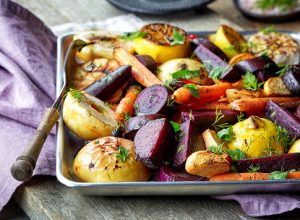
Your digestive process begins the moment you start chewing your food. Essential enzymes are released in the mouth to help kick-start the digestive process. As food is carried through the digestive system, more enzymes and acids are used to further break down food so that nutrients can be absorbed.
You can tell if you are deficient in nutrients if you feel fatigued or have dull hair or skin. And over time, a lack of nutrients can turn into more serious health problems.
Many factors can contribute to poor nutrient absorption, including conditions like irritable bowel syndrome and inflammatory bowel diseases like Crohn’s disease or colitis. Taking certain medications, stress, alcohol consumption, or even having a food intolerance can also result in poor nutrient absorption.
Below you will find easy and helpful tips to ensure you get the most out of every meal you consume so that you aren’t missing out on essential nutrients.
9 simple tips to boost nutrient absorption
Stay hydrated
Being well-hydrated can also aid in digestion. You can begin to experience immediate changes in your stool when you aren’t well hydrated. Furthermore, our bodies need water to transport nutrients through the blood. Therefore, ensure you are drinking enough water throughout the day.
A good indicator of hydration is to look at your urine. You want to aim for a pale yellow color as a good sign of hydration.
Eat a variety of foods in one meal
Breakfast, lunch, and dinner should have a combination of different nutrients to ensure you are getting a variety of vitamins and minerals at every meal. And this should change daily, so if you’re a person of habit, it may be wise to switch up your meals daily.
Avoid drinking caffeinated tea at meals
Although drinking black or green tea is healthy for you, it is also known to inhibit the absorption of iron. So, you should avoid a hot cup of it around mealtime.
Avoid or reduce your intake of caffeine and alcohol
Caffeinated beverages and alcohol are known to be diuretics, which can reduce the number of digestive enzymes in the body. When there are less digestive enzymes, it’s far more difficult for the body to properly absorb nutrients from the foods we eat.
Pair vitamin C foods with iron
Anemia is a condition caused by low iron. The trick to absorbing more iron is to pair it with vitamin C. For example, drink some orange juice with dark leafy greens, which are rich in iron.
Make sure each meal contains a healthy fat
Many of us are scared when we hear the word “fat,” but there is such a thing as healthy fat. Healthy fats are found in nuts, avocados, and olive oil, to name a few.
Take a probiotic
Probiotics help to nourish the gut by increasing the number of good bacteria, which aid in digestion, thus boosting nutrient absorption.
Probiotics don’t have to be in pill or powder form. They can be found in fermented foods and yogurt.
Consider taking a digestive enzyme
Digestive enzymes work in the body to help break food down into the nutrients you need. While your body does produce some enzymes itself, raw foods like vegetables and fruit contain the enzymes your body requires for specific kinds of nutrients. So if you’re eating over-processed and prepared foods and aren’t getting enough raw produce, you’re likely lacking in many digestive enzymes.
When looking at digestive enzyme supplements, you’ll want to pick one that contains multiple types of enzymes. For example, protease is the enzyme needed to digest protein-containing foods, while amylase is the kind that helps your body break down starchy foods. You’ll want to cover as many of your digestive enzyme bases as possible.
Manage your stress
As mentioned earlier, stress is a factor that can disrupt digestion and impede nutrient absorption. Furthermore, stress is known to slow down digestion, which can lead to constipation. So, finding helpful ways to reduce stress can get things moving along once again.
By following these simple tips, you can experience improved digestion along with ensuring you are getting the most out of your healthy meals.